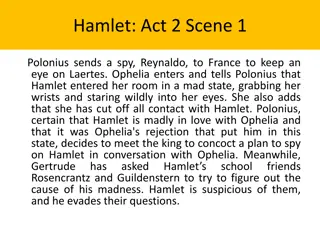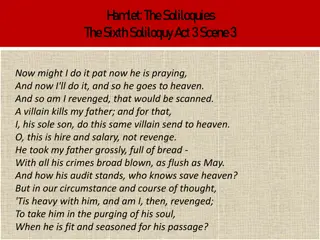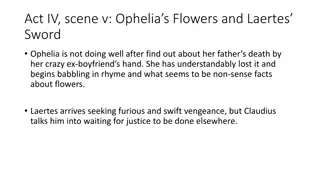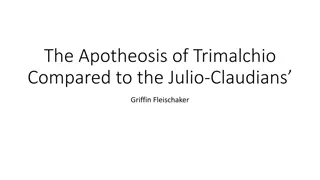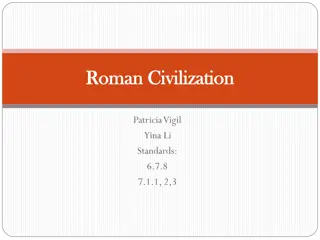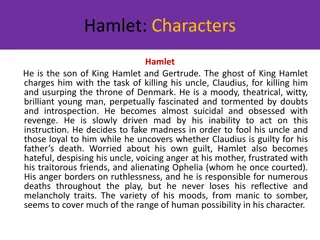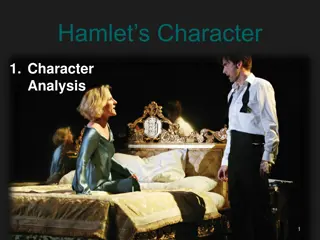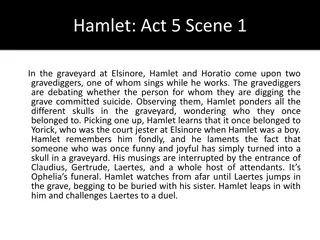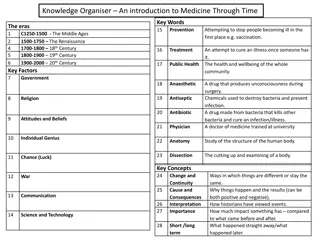Intriguing Developments in Shakespeare's "Hamlet" Act Two
Polonius sends a spy to France, Ophelia recounts Hamlet's erratic behavior, and Hamlet plans to expose King Claudius's guilt through a play. Key plot points established include Hamlet's supposed madness due to unrequited love, the arrival of his friends Rosencrantz and Guildenstern, and the actors'
0 views • 4 slides
Analysis of Hamlet's Sixth Soliloquy in Act 3, Scene 3
Hamlet's Sixth Soliloquy in Act 3, Scene 3 delves into his inner turmoil as he contemplates seeking revenge on Claudius for his father's murder. Despite having the perfect opportunity to kill Claudius while he prays, Hamlet hesitates, questioning whether sending him to heaven would truly be an act o
0 views • 7 slides
Hamlet's Second Soliloquy: The Revelation and Vow for Revenge
Hamlet's second soliloquy in Act 1, Scene 5, follows the shocking revelation from his father's ghost that Claudius is the true murderer. Filled with grief and anger, Hamlet vows to avenge his father's death, referring to his mother as a "pernicious woman" and his uncle as a "smiling damned villain."
0 views • 5 slides
Insights from Critics on Hamlet's Character and Themes
Various critics provide intriguing perspectives on Hamlet's character and the themes within the play. Swinburne emphasizes Hamlet's inner nature as a conflux of forces, while Samuel Johnson views Hamlet more as an instrument than an agent. Von Goethe discusses the challenges faced by Hamlet in fulfi
0 views • 22 slides
Tragic Events Unfold in Act IV of "Hamlet
Ophelia, reeling from her father's death, cryptically speaks about flowers, revealing underlying accusations. Laertes, manipulated by Claudius, seeks vengeance impulsively. Hamlet's unseen pirate adventure raises questions. Ophelia's demise in the brook signifies a tragic turn in the play.
2 views • 6 slides
Comparing Apotheosis in Roman Culture: Trimalchio and the Julio-Claudians
Tracing the concept of apotheosis in Roman culture, this content explores the contrasting deification processes of Trimalchio and the Julio-Claudian emperors, focusing on the visual representations and societal perceptions of divinity. From Trimalchio's extravagant depiction to the imperial cult of
0 views • 6 slides
The Skinhead Hamlet - Act 1, Scene 4
In Act 1, Scene 4 of "The Skinhead Hamlet," the Ghost reveals to Hamlet that he was murdered by Claudius, the current king of Denmark. The Ghost urges Hamlet to seek revenge for his untimely death, shedding light on the treachery that led to his demise. This snippet captures the intense and pivotal
0 views • 18 slides
Analysis of Act I Scene IV in Hamlet: Themes and Symbolism
Hamlet waits on the castle battlements for the ghost of the dead king to appear. Despite objections, he follows the ghost, setting a tone of nervous anticipation. The scene contrasts domestic and military settings, emphasizing urgency. The sound of cannon signals excessive drinking and partying at C
0 views • 15 slides
Roman Civilization Overview
Roman civilization was influenced by Greek culture, as seen in their art, literature, and architecture. Roman artists and writers borrowed ideas from the Greeks but adapted them to suit their needs. They created realistic statues, innovative buildings with features like arches and domes, and iconic
0 views • 36 slides
Exploring 'Anatomy of Grey' by Jim Leonard Jr.: Unraveling Themes of Love, Destiny, and Grief
In "Anatomy of Grey" by Jim Leonard Jr., set in 1880s Grey, Indiana, the play delves into the lives of characters like June Muldoon, Galen Grey, and Rebekah Muldoon as they navigate love, loss, and the impact of destiny. The small town's physical and emotional struggles are vividly portrayed, reflec
0 views • 11 slides
Character Analysis of Hamlet: A Tragic Tale of Revenge and Betrayal
Son of King Hamlet, Hamlet is charged with avenging his father's murder by his uncle, Claudius, in Shakespeare's iconic play. As Hamlet spirals into madness and dark thoughts, he struggles with doubts, guilt, and revenge. Claudius, the cunning antagonist, hides his guilt while plotting against Hamle
0 views • 7 slides
Shakespearean Dramatic Techniques Analysis
Explore the intricate use of monologues, soliloquies, structural divisions, and emotional responses in William Shakespeare's plays. Delve into the dialogues between characters like Hamlet, Gertrude, and Claudius to uncover themes of love, madness, and expectation. Discover how Shakespeare utilizes d
0 views • 23 slides
Analysis of Act I, Scene II in Shakespeare's Hamlet
The scene delves into complex themes such as royalty, grief, revenge, and morality, focusing on Hamlet's internal struggles and interactions with other characters. It highlights Hamlet's melancholic nature, his relationships with his mother and deceased father, and introduces key questions surroundi
0 views • 17 slides
Enhancing Robot Control in Neurosurgery through Force Sensing Integration
The project aims to improve the cooperative control of the Galen robot in neurosurgery by measuring and integrating tool-to-tissue forces. By sensing these forces, the system can enhance visual feedback, establish safety limits, evaluate surgical skills, and allow unbiased comparisons of techniques.
0 views • 12 slides
History of Psychological Disorders and Treatment Methods
The chapter delves into the terms and history of psychological disorders, covering aspects like prevalence, incidence, sex ratio, age of onset, prognosis, etiology, and early beliefs surrounding mental illness. It explores the influence of figures such as Hippocrates and Galen, as well as advancemen
0 views • 15 slides
Ethics of Animal Experimentation in Medical Research
Exploring the application of utilitarianism to animal experimentation for medical research, this content delves into the history of vivisection, animal rights activism, and the work of historical figures like Claudius Galen in advancing medical understanding through dissection. The ethical considera
0 views • 17 slides
Character Analysis of Hamlet in Shakespeare's Play
Explore the character of Hamlet in William Shakespeare's renowned play through comparisons with other characters such as Horatio, Claudius, Fortinbras, and Laertes. Delve into the contrasting qualities, motivations, and actions of Hamlet and these characters to gain a deeper understanding of Hamlet'
0 views • 8 slides
Polonius in Shakespeare's Hamlet: Extended Character Analysis
Polonius, King Claudius's advisor and the father of Ophelia and Laertes in Shakespeare's play "Hamlet," is portrayed as a character concerned with appearances and reputation. His fatherly advice, though well-intentioned, is filled with clichéd aphorisms. As a royal advisor, Polonius engages in unde
0 views • 25 slides
Tragedy in Elsinore: Hamlet's Final Acts
Hamlet encounters the gravediggers, reflects on life and death in the graveyard, and faces betrayal and tragedy in a series of duels orchestrated by Claudius. As the plot unfolds, there are deaths, poisoned schemes, and Hamlet's own demise, ending with Fortinbras claiming the throne. The major plot
0 views • 5 slides
Journey Through Medieval Medicine: Key Concepts and Practices
Explore the evolution of medicine from the Middle Ages to the Renaissance, focusing on key elements like prevention, treatment, public health, and individuals like Hippocrates and Galen. Discover the influence of superstitions, the Church, and government in healthcare practices of the past. Dive int
0 views • 5 slides
